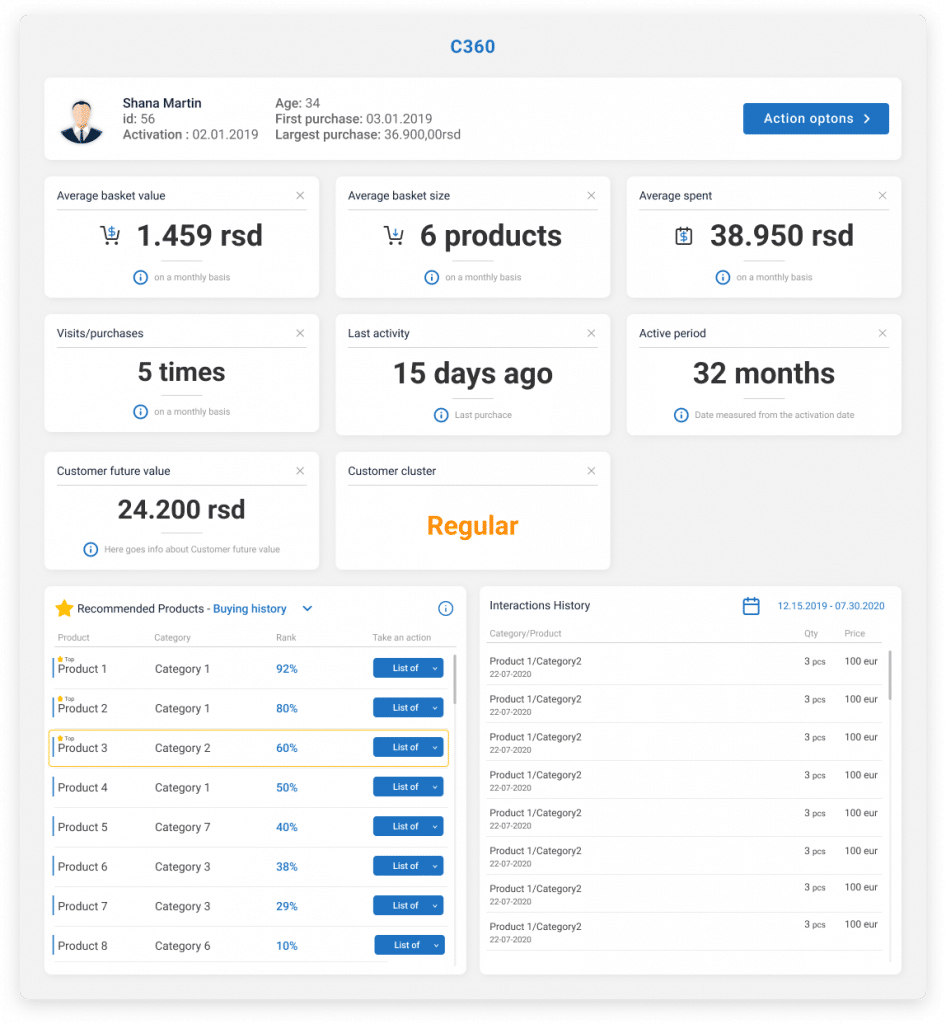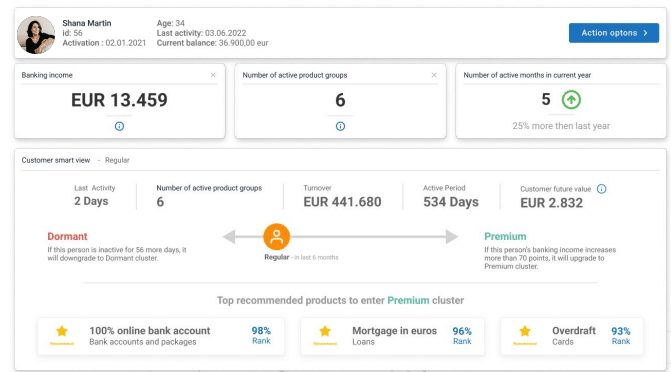What is conversational banking?
The financial industry is undergoing a digital revolution, with traditional methods of banking being replaced by faster, more efficient, and…
Read more28. 02. 2023.

Data-driven personalization is a critical aspect of any successful retail or e-commerce strategy.
By tailoring your messages, offers, and product recommendations to each customer’s unique interests and preferences, you can create a more engaging and meaningful experience that drives loyalty and increases sales.
However, personalization is only effective if you have the right data. To help you with that part, we will explain what data-driven personalization is and walk you through the essential data for successful personalization.
Do you know that, despite the economic challenges, almost 69% of business leaders are increasing their investment in personalization?
According to Segment’s State of Personalization 2023 report, they are – which paints a very bright picture about how important personalization actually is.
Let’s quickly explain what data-driven personalization is.
Data-driven personalization assumes that you already have enough data about an individual to provide tailored content precisely when they need it. Essentially, data-drivenpersonalization is all about delivering timely value. The era of indiscriminate mass messaging and generic approaches is over, isn’t it?
In our modern world, it’s imperative to be precise, individualized, and strategically oriented in your marketing endeavors.
The reasons behind the importance of data-driven personalization in retail and e-commerce are many. Let’s explore just a few of them:
The way customers are engaging with brands and businesses has significantly changed.
What they want is for businesses to understand their individual requirements and expectations. In reality, 66% of them feel they are often treated like numbers.
Who doesn’t like a personalized message from their favorite brand offering them an exclusive discount for a product they love?
At the end of the day, it’s all about how you make them feel.
This is why it’s essential to truly know who your shoppers are and use personalization to tailor the shopping experience to each and every one of them. It’s what makes them feel less like numbers and more like valued and understood members of your community.
When your customers feel valued, understood, and heard, they feel more inclined to interact with your brand or products through product reviews, genuine recommendations, and personalized content.
Engaged customers are more likely to become brand advocates in the long run.
Trust and transparency are key to gaining your customers’ loyalty.
Think about it this way – when you set out to deliver personalized recommendations and offers to your customers, they are more likely to return to your website or online shop.
Considering they are expected to leave personal information there, it’s no wonder many are concerned about the privacy of the data they leave there.
In case you weren’t aware of this problem, let us share an interesting statistic:
Only 51% of consumers feel like they can trust brands to keep their personal data secure and use it responsibly.
So, almost half of consumers think businesses don’t respect their privacy and don’t behave responsibly with the data they share on their websites.
So, the answer here is pretty simple. If you want to ensure personalization and protect the privacy of your customers, then be open and honest about the data you collect.
When they realize that their data is safe with you, they will trust you and come back in no time.
If you’re already using data-driven personalization to boost your marketing efforts, you know that it can boost your revenue and sales.
Concrete numbers from one McKinsey Survey speak in favor of this, too. According to the survey, personalized marketing can boost revenues by 5 to 15% and increase marketing ROI by 10 to 30%.
How does personalization do that?
By suggesting relevant products, cross-selling, and upselling.
The simple math is that when your customers see products that match their interests and needs, they are more likely to make repeated purchases.
According to Google, 90% of leading marketers think that personalization significantly contributes to business profitability.
Targeted marketing saves time and money by not sending irrelevant messages to customers. Personalized marketing sets you apart from competitors who offer a one-size-fits-all shopping experience. You know that one size doesn’t fit all!
By showing personalized product recommendations or sending reminders based on a customer’s browsing and shopping history, you can reduce those cart abandonment rates and make sure your customers come back for more.
Data-driven personalization is the hardest digital strategy to implement, according to 63% of marketers.
And even though collecting and analyzing customer data might be a bit hard, it’s one of the best ways to gather valuable insights into how your consumers behave and what they prefer. But, you can use this vast data to refine your product offerings and improve marketing strategies.
The end result – enhanced personalization that provides a more tailored, engaging, and relevant shopping experience.
Overall, personalization in retail and e-commerce not only benefits customers by saving time and offering products they genuinely want but also helps you stay competitive in a rapidly evolving market.
As we mentioned at the beginning, enhanced personalization relies on a foundation of essential data.
The bedrock of this data form:
Let’s see how this empowers businesses to create deeply personalized experiences that foster loyalty and increase sales.

The first step to data-driven personalization is collecting customer data. This includes crucial details about your customers like
You can collect this data through sign-ups on your website, social media channels, or in-store interactions.
With the collected data in hand, you can start building comprehensive customer profiles. These profiles serve as a repository of individual preferences and characteristics, aiding in understanding and predicting customer behavior.
Finally, armed with well-defined customer profiles, you can segment your audience based on shared characteristics and interests. This enables you to create precisely targeted messages and promotions, ensuring that your engagement efforts resonate effectively with each distinct group of customers.
Transaction data is a goldmine of information when it comes to personalization.
By analyzing a customer’s purchase history, you can gain insights into their buying behavior, purchase preferences, and spending habits. This data can help you create targeted messages, offers, and promotions that are tailored to the specific needs and interests of your customers.
For example, if you notice that a customer regularly buys products related to a particular hobby or interest, you can create a personalized Viber campaign to send targeted messages or promotions related to that interest.
Analyzing your product data is another critical aspect of data-driven personalization.
By looking at the products that your customers are interested in or purchasing, you can gain insights into their preferences and interests. This data can help you create targeted product recommendations, promotions, and even new product lines tailored to your customers’ needs.
For example, if you notice that a significant number of your customers are interested in eco-friendly products, you can create a new product line that emphasizes sustainability and ethical manufacturing.

There are a variety of personalization tools and platforms available that can help you make the most of the customer, transaction, and product data you collect.
These tools can help you automate and personalize your messaging and promotions, making it easier to engage with your audience on a more individual level.
For example, you can use email marketing platforms that allow you to create personalized email campaigns that automatically pull in data from your customer profiles and transaction history.
But if you want to go beyond that, you can try Solver AI Suite, our modular platform that can drive your business from assumptions to concrete results. In fact, more than 9 in 10 companies are using AI-driven personalization to drive growth in their business
With Solver AI, you can always rely on full end-to-end personalization on multiple channels. This data-centric solution will give you valuable business insights and allow you to make more informed decisions.
Personalization can be a daunting task, but it’s important to start small and test your efforts.
You can start by segmenting your audience based on basic demographic data or interest information to create targeted messages or promotions.
After that, make sure to conduct A/B testing to compare the effectiveness of your personalization efforts and make adjustments accordingly. We can’t stress the importance of A/B enough!
Over time, you can refine your personalization efforts based on your customer and transaction data, creating a more engaging and relevant experience for your customers in the long run.
Data-driven personalization is truly a critical aspect of any successful retail or e-commerce strategy. Using customer, transaction, and product data, you can easily deliver targeted messages, promotions, and product recommendations to your customers. Never stop learning about their needs and interests – that’s what data-driven personalization is all about.
By starting small, testing your efforts, and using personalization tools, you can create a more engaging and meaningful experience for your customers, driving loyalty and increasing sales.
The financial industry is undergoing a digital revolution, with traditional methods of banking being replaced by faster, more efficient, and…
Read moreYou’re running a business, constantly looking for ways to cut costs, boost efficiency, and increase revenue. But here’s the harsh…
Read moreAgentic AI will transform industries, but with one important exception — without consolidated data, even the most sophisticated AI systems…
Read more